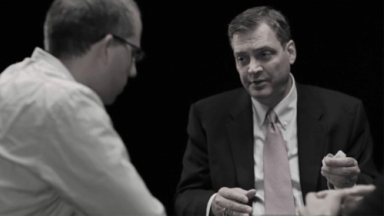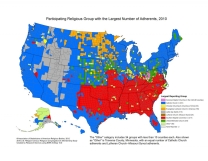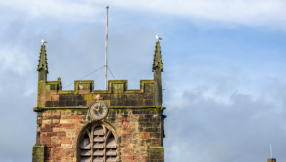
Theologian and President of the Southern Baptist Theological Seminary in Kentucky, Albert Mohler, has condemned suggestions that there can be a 'third way' between acceptance and rejection of homosexuality and same-sex marriage. "The issue is binary. A church will recognise same-sex relationships, or it will not," he writes.
Well-known for his conservative views, Mohler has been vocal in his rejection of same-sex relationships and their affirmation in a Church context. In an interview with Jonathan Merrit of the Religion News Service earlier this year, Mohler stated clearly: "I am confident that the church has not misread the Bible for 2,000 years on this question, and that the normalization of same-sex sexuality and same-sex marriage cannot be justified in any way by an honest reading of the Scriptures".
It comes as no surprise, therefore, that he has once again positioned himself firmly on the issue, and has written a blog ahead of this week's Southern Baptist Convention's annual meeting about the necessity of doing so.
"There is no third way. A church will either believe and teach that same-sex behaviours and relationships are sinful, or it will affirm them. Eventually, every congregation in America will make a public declaration of its position on this issue. It is just a matter of time (and for most churches, not much time) before every congregation in the nation faces this test," he writes.
Mohler's words come in response to a Southern Baptist minister in California, Danny Cortez – pastor of New Heart Community Church in La Mirada – who has recently announced his that he no longer believes homosexuality is a sin.
Shortly after Cortez came to this conclusion, his son came out to him as gay.
In a letter to Christian blogger John Shore, Cortez explains that his church has since decided to become a "Third Way church".
"We will accept the LGBT community even though they may be in a relationship. We will choose to remain the body of Christ and not cast judgement. We will work towards graceful dialogue in the midst of theological differences," Cortez says.
"We see that this is possible in the same way that our church holds different positions on the issue of divorce and remarriage. In this issue we are able to not cast judgement in our disagreement."
Mohler, however, argues that this is not possible – underlined, he believes, by the decision of some "traditional" members of Cortez's church choosing to leave the congregation over the issue.
"Why? Because there is no 'third way.' The New Heart Community Church has voted to 'accept the LGBT community even though they may be in a relationship.' Even if it is claimed that some continuing members of the church are in disagreement with the new policy and position, they will be members of a church that operates under that new policy. At the very least, their decision to remain in the congregation is a decision to stay within a church that affirms same-sex behaviours and relationships. That is not a middle position. It is not a 'third way,' Mohler contends.
"For some time now, it has been increasingly clear that every congregation in this nation will be forced to declare itself openly on this issue. That moment of decision and public declaration will come to every Christian believer, individually. There will be no place to hide, and no place safe from eventual interrogation. The question will be asked, an invitation will be extended, a matter of policy must be decided, and there will be no refuge."
He continues: "There is no third way on this issue. Several years ago, I made that argument and was assailed by many on the left as being 'reductionistically binary.' But, the issue is binary. A church will recognize same-sex relationships, or it will not. A congregation will teach a biblical position on the sinfulness of same-sex acts, or it will affirm same-sex behaviours as morally acceptable. Ministers will perform same-sex ceremonies, or they will not".
Mohler notes also that the Southern Baptist Convention now faces the "heartbreak[ing]" decision of whether to allow Cortez's church to continue as a member, or to exclude it from the Convention, and furthermore must face "a test of its own resolve and convictional courage" as churches must place themselves on one side of the debate or the other.
"Sooner or later — and probably sooner — the answer of every church and Christian will be either yes or no," Mohler concludes.
His words have been affirmed by progressive theologian and blogger Tony Jones, who also contends that there is no real "middle-ground", and any period of reflection is part of a process, not the conclusion.
The Southern Baptist Convention begins 10 June in Baltimore.
















